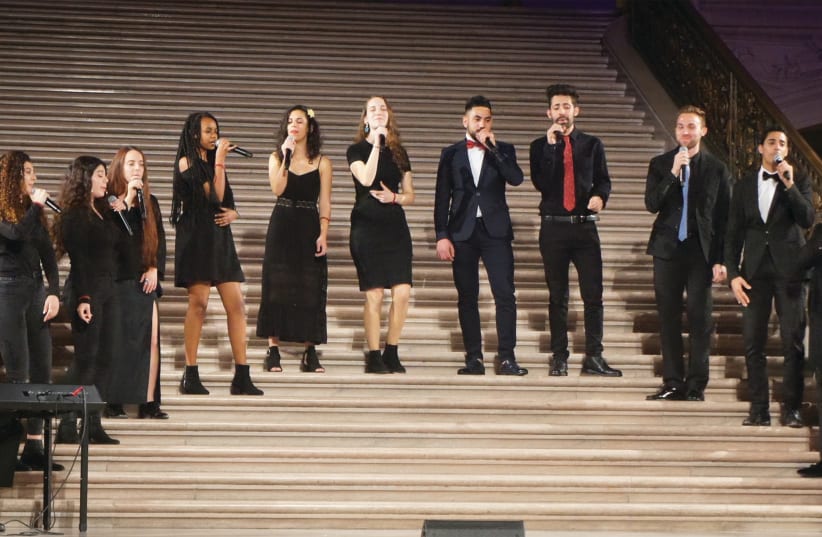It has been a tough year for everyone with the COVID-19 pandemic, the latest war between Israel and Hamas and tensions between Arabs and Jews in Israel. With the outbreak of the virus, it seemed that musical groups would not be able to function at all on Zoom. There is a time lag that makes it almost impossible to sing together.
So the Jerusalem Youth Chorus, founded in 2012, decided to try something new.
“Given the existential test that COVID has posed to choirs, we have passed with flying colors,” founder Micah Hendler told The Jerusalem Report. “Many other choirs tried to do a second-best choral experience, but we pivoted our entire program to be around dialogue and collaborative songwriting.”
The 30 participants (half Palestinian, half Israeli) were divided into two dialogue groups one of younger, newer members aged 13-15, and the other of older, more veteran members who have already been singing together for several years. Each dialogue group will also write a song together, as well as individual songs they are each writing. These songs will be showcased in a gala later this summer.
Ala-din Gudah, 23, from east Jerusalem, has been in the choir for 10 years, and currently works for the Youth Chorus. He said the Chorus has changed him both musically and politically.
“I used to know only about Arabic music but there is so much more to music,” he said. “There is always something new to learn. I play darbuka (an Arab drum) and I used to only play it only with Arab songs. But now I see that every song has a beat and I can play it to anything.”
When it comes to politics, Ala-din says the Chorus has offered him a chance to explain the Palestinian position to his Israeli neighbors.
“A lot of Jews here think that all of the Arabs are terrorists,” he said. “I would tell them about what it’s like at checkpoints and they had never heard about it.”
The Jerusalem Youth Chorus is believed to be the only organization that is doing both music and Arab-Jewish dialogue. Shifra Jacobs, an alumni of the choir who is currently running the music program, said that in pre-corona times, the structure of the 3.5 hour weekly meeting was first music, then dialogue, and then another music session. All meetings are translated into both Arabic and Hebrew, so that all participants can be involved.
“It doesn’t matter what you speak about in the dialogue group,” she said. “But the fact that you come back to rehearsal teaches you to put those things aside and make good music together. We see music as a tool to create that harmony.”
During corona, the program was broken up with one day focused on dialogue and one on music. Shifra said that there are auditions to be accepted into the Chorus but motivation is as important as inherent talent.
“You don’t have to be the world’s greatest singer to join but you have to be willing to come to the choir and learn about the other side,” she said. “If you enjoy singing and want to develop your voice, you are welcome. We’ve had lots of people who come and they are not confident in their singing and after a couple of years they are amazing.”
Most summers, the Chorus goes on tour to countries like the US, Japan and Switzerland, offering the members a chance to spend intensive time together. That, of course, hasn’t happened with corona, but Shifra said they are hoping to have some kind of local summer program. Last year, they held a summer camp in the Armenian quarter in the Old City of Jerusalem, and after the camp several Armenian singers then joined the Chorus.
Hendler, the founder of the Jerusalem Youth Chorus, said it’s impossible to distinguish between the importance of the dialogue and the music. “In the Chorus we use the music we make and the relationships we build as a community as a container for the dialogue,” he said.
Most of the songs are written in both Hebrew and Arabic.
Hendler said he is especially proud that Ala-din and Shifra, both alumni of the Chorus, are running this year’s music program which has focused on songwriting. “They have learned to understand the structure of a song, its themes and concepts,” Shifra said. “They also learned how to write lyrics and express themselves musically.”
Funding for the Chorus comes from both private foundations and donors who have been inspired by the work it does. In the past, it has also received support from the American government and USAID.
Hendler said they hope to start meeting in person soon, for both music and dialogue. The Jerusalem Youth Chorus has gone through difficult times before, he said, and has pulled through. In 2014, during the war in Gaza, many dialogue groups just stopped meeting. But the Chorus continued.
